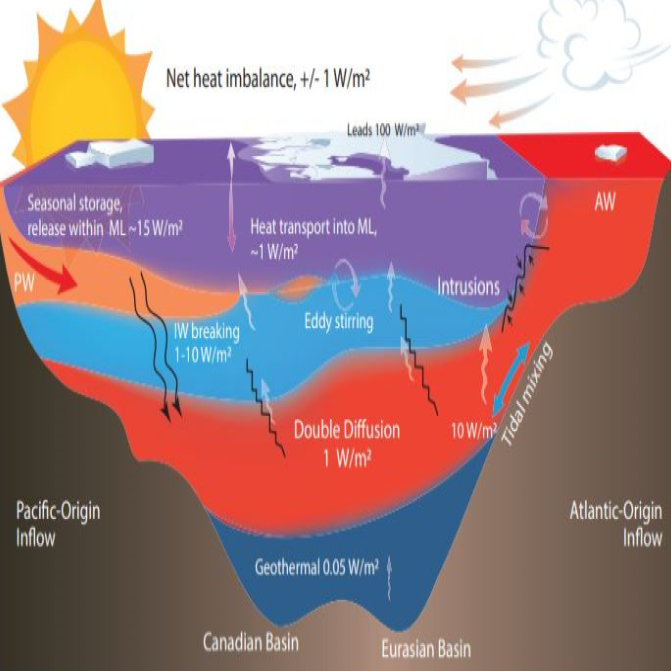Defrosting the Arctic Ocean layer cake.

Dramatic sea ice loss – “defrosting” of the Arctic has occurred as it warms 4 times faster than the rest of earth. This and other rapid changes in the Arctic, such as a freshwater release from the Beaufort Gyre (BG), may have global consequences for weather and climate if they disrupt the North Atlantic Ocean’s overturning circulation. Yet processes contributing to Arctic change are complex, with unresolved ocean-cryosphere-atmosphere feedbacks; e.g. solar radiation absorbed better by the darker ice-free water can, in turn, accelerate sea-ice melt. Heat loss to the atmosphere and evaporation occurring over expanding open water areas has likely intensified Arctic storms. Storms injecting more of their energy directly into the ocean, may mix up heat stored in deep ocean. But mixing may also be offset by the stabilizing effect of fresh surface meltwater enhancing Arctic Ocean stratification or “layering”, by insulating sea ice from the warm ocean below. Mixing and stratification thus compete to set sea surface temperatures that are critical to climate feedbacks here.
Despite the lack of discernable long-term trends in estimates of total mixing, the Eurasian Arctic has lost stratification and sea ice as it succumbs to “Atlantification” by ever-warming inflows from the North Atlantic. In contrast, BG stratification, enhanced by a steady freshwater accumulation over several decades, is now at risk of being released into the North Atlantic. This project will use observations and models to quantify trends in Arctic stratification and individual mixing processes (both vertical and lateral) to assess the role of ocean and atmospheric drivers of change, and identify potentially critical ice-ocean-atmosphere feedbacks, so as to evaluate the increasing risks of rapid Arctic and global climate change.
Eligibility.
Candidates shall be good honours graduates with degrees in physical natural sciences such as physics, maths, meteorology, physical geography etc, of a recognised university or comparable university, or persons holding equivalent qualifications who show evidence of exceptional ability, or who have demonstrated their ability in graduate studies. Diversity within environmental sciences is historically low, which means we are missing out on contributions from many under-represented communities. Thus applicants with historically-excluded protected characteristics are strongly encouraged to apply and will be warmly welcomed and valued at the School of Ocean Sciences, Bangor.
Email address for enquiries.
y.lenn@bangor.ac.uk
